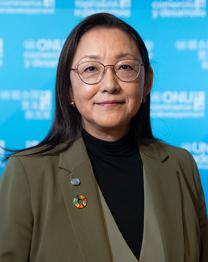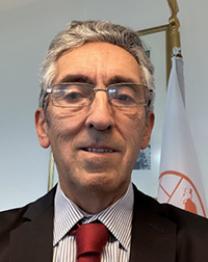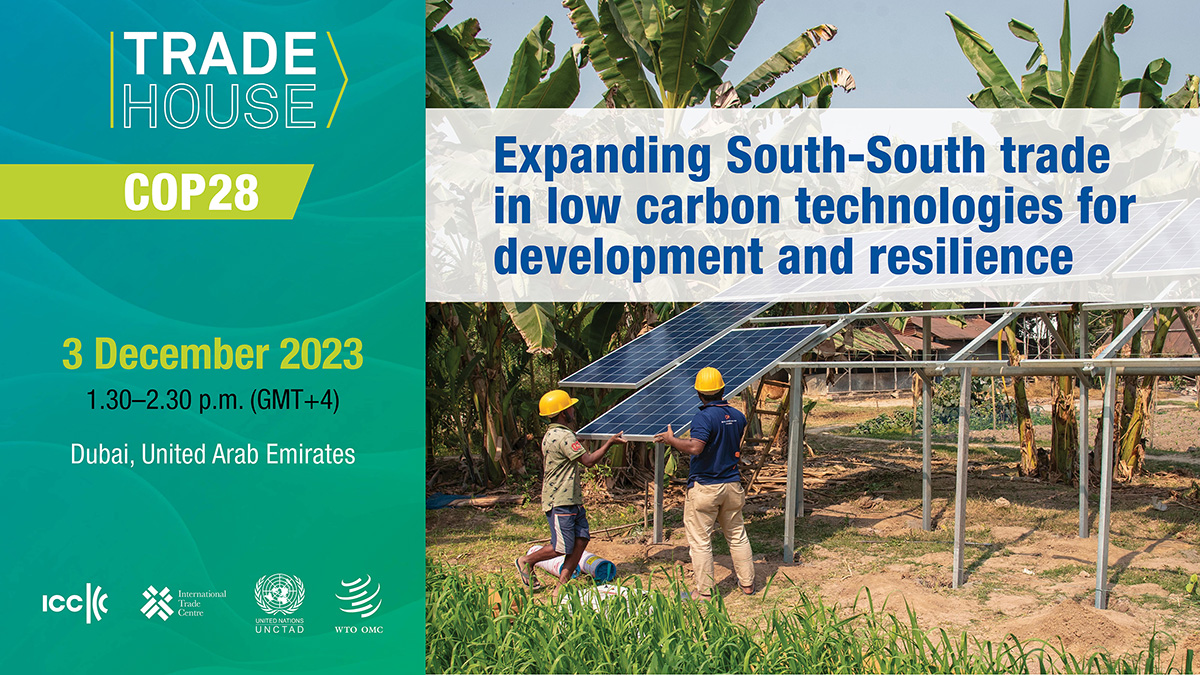
Bold actions commensurate with the urgency of the current climate situation are needed for a successful energy transition. Most of the energy transition must be based on renewable sources. A record-breaking $1.3 trillion in worldwide investments in energy transition technologies was reached in 2022.
Global annual spending in these technologies must more than double to $5 trillion to maintain Paris Agreement target of limiting future global warming to 1.5°C. By 2030 global energy transition investments must reach $5.5 trillion annually over the next 8 years (IRENA, 2023).
UNCTAD estimates that developing country investment levels must reach $1.7 trillion annually. However, developing countries have only attracted $544 billion in FDI for clean energy in 2022.
The magnitude of required investment indicates a corresponding huge, growing commercial market for low carbon energy technologies that developing countries must seize as producers and exporters of renewable energy goods and services. The opportunity cost of not participating in this growing market and risks of leaving developing countries behind is high.
This event will examine how South-South Trade, and more specifically the Global System of Trade Preferences among Developing countries (GSTP), can be harnessed to reap commercial and development benefits from the energy transition in low and zero carbon technologies.
It will explore how the preferential South-South trade on these technologies, inputs and upstream goods required for their manufacture can support National Determine Contributions (NDCs) implementation by Developing countries while creating new investment, production, trade, and transfer of technology opportunities.
This event will be live streamed
Programme
Moderator:
- Ms. Miho Shirotori, Acting Director of the Division on International Trade and Commodities at UNCTAD
Keynote:
- Ms. Edel Moraes, Vice Minister of Environment and Climate Change, Brazil (tbc)
Panellists:
- Ms. Chantal Line Carpentier, Head, Trade, Environment, Climate Change and Sustainable Development Branch, DITC, UNCTAD
- Ms. Elisabeth Press, Director of Planning and Programme Support, IRENA
- Ms. Carolyn Deree Birkbeck, Executive Director, Forum on Trade, Environment & the SDGs (TESS)
- Ms. Maria José González, Senior adviser, Ministry of Energy, Uruguay
- Mr. Carlos Correa, Executive Director, South Centre
Miho Shirotori is the Head of the Trading Systems, Services and Creative Economy Branch in UNCTAD's Division on International Trade and Commodities.
She leads a team of experts assessing pathways to improve the developmental impact of trade by negotiating and implementing trade agreements, strengthening policy-making capacity in services trade, and promoting the creative economy to achieve more inclusive economic diversification.
Miho's own expertise includes the development impacts assessment of preferential market access for developing countries, most notably the Generalized System of Preferences (GSP).
Miho has been contributing her technical and institutional knowledge to support UN Member States in shaping decisions to promote more equitable trade across multilateral, North-South, and South-South trade frameworks.
Miho demonstrates a strong track record of leadership and team management within the international organizational context.
She holds master's degrees in economics (London School of Economics and Political Science, international economics (Graduate Institute of International and Development Studies, Geneva), and public administration (Harvard Kennedy School).
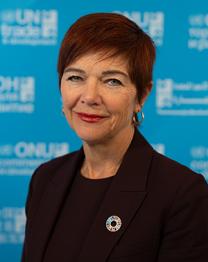
Dr. Carpentier, from Quebec, Canada, is Head of Trade, Environment, Climate change, and Sustainable Development Branch of UNCTAD’s Division on International Trade and Commodities (DTIC). Her work with governments and partners foster green, blue, circular, and impact economies that supported by trade, are key to addressing the triple planetary crisis: climate change, pollution and biodiversity loss. She came to Geneva after leading the UNCTAD New York office, representing the SG and coordinating UNCTAD’s support to inter-governmental negotiations of the UN General Assembly (2015-2023).
She held several other positions. At the UN Department of Economic and Social Affairs, she facilitated the engagement of NGOs, women and youth’s groups, business, local authorities, etc. in the SDGs negotiations and the UN Rio+20 Conference (2011-2015). She also supported the Commission on Sustainable Development research and negotiations on sustainable agriculture and sustainable consumption and production (2007-2011).
Prior to joining the UN, she Headed the North American Free Trade Agreement Commission for Environmental Cooperation’s, Environment, Economy and Trade Division (2000-2007), was Agro-environmental policy analyst for Winrock International (1998-2000) and post-Doctoral fellow/Brazil office manager for the International Food Policy Research Institute (1996-1998).
She has a PhD. in Agro-Environmental Economics from Virginia Tech, as well as a MSc. and BSc. in Agro- Economics from McGill University and is an ironman and ultramarathoner. She is a Yale World Fellow, received the 2023 Schwab Foundation for Social Entrepreneurship public intrapreneur award, and is a UNEP Who’s Who of Women and the Environment.

Ms Elizabeth Press is Director of Planning and Programme Support in the Executive Office of the International Renewable Energy Agency (IRENA). She leads the Agency’s programme and strategy development and related activities in IRENA governing bodies. Ms Press represents IRENA in climate-focused organisations and initiatives and leads several special projects, including geopolitics of energy transitions. She also oversees diversification of the Agency’s resource base and is IRENA’s focal point in Europe. Ms Press has served with IRENA since its inception in 2011. Before joining the Agency, she worked for some 18 years in development and peace and security, predominately with the United Nations. Ms Press served in Africa, Europe, Middle East, North America, and South-East Asia. She has an MA in Public Administration.
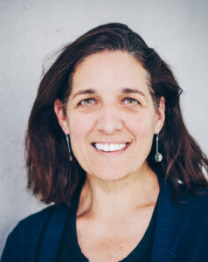
Dr. Deere Birkbeck is Director of the Forum on Trade, Environment and the SDGs (TESS), a partnership of the Geneva Graduate Institute and UNEP, where she leads the initiative’s work to foster inclusive international cooperation on trade and sustainability. Her recent research focuses on climate change and trade, where notably she has championed the idea of an inclusive Trade Ministers Coalition on Climate, as well as the global governance of plastics and plastic pollution. She is also an Associate Fellow of Chatham House. Dr. Deere Birkbeck is the founder and Board Chair of Global Policy Reporting, a Geneva-based non-profit organisation dedicated to open access and independent news reporting, which houses Health Policy Watch (launched in 2019) and Intellectual Property Watch for the prior 15 years. She also served as an Assistant Director at the Rockefeller Foundation in New York where she was responsible for grantmaking on intellectual property, trade and sustainable development. Previously, she worked for the Global Economic Governance Programme at the University of Oxford, the International Centre for Trade and Sustainable Development (ICTSD), and the Overseas Development Council.
Dr. Carlos María Correa of Argentina has been Executive Director of the South Centre, an intergovernmental organization based in Geneva, since 1 July 2018.
Prior to this, he was the Special Advisor on Trade and Intellectual Property of the South Centre. Dr. Correa is a renowned international authority on intellectual property and technology issues.
Professor Correa has worked with the Argentine government and has been the Director of the Center for Interdisciplinary Studies on Industrial Property and Economics (CEIDIE) at the Law Faculty of the University of Buenos Aires. He was a member of the UK Commission on Intellectual Property Rights, the Commission on Intellectual Property Rights, Innovation and Public Health established by the World Health Assembly and of the FAO Panel of Eminent Experts on Ethics in Food and Agriculture.
He has been a visiting professor in post-graduate courses of several universities and consultant to various regional and international organizations. He has advised several governments on intellectual property, innovation policy and public health. He is the author of several books and numerous articles.
Professor Correa is both a lawyer and economist from the University of Buenos Aires and holds a PhD in Law from the University of Buenos Aires.



